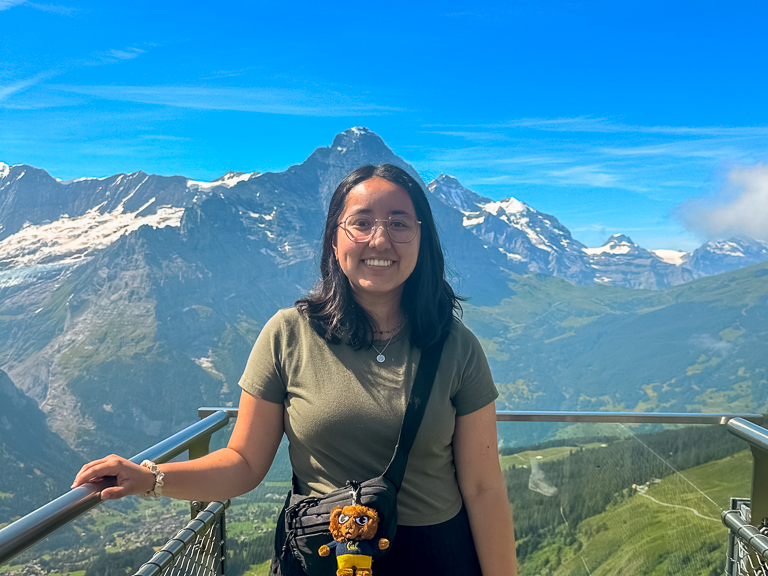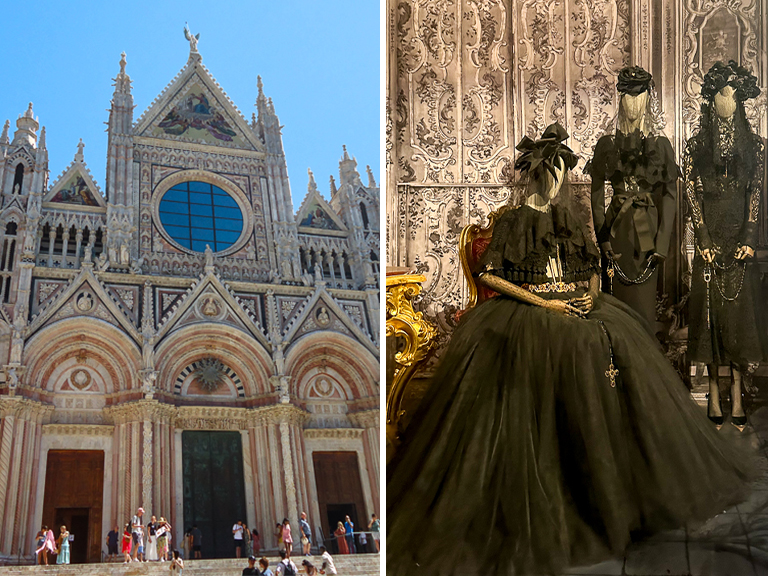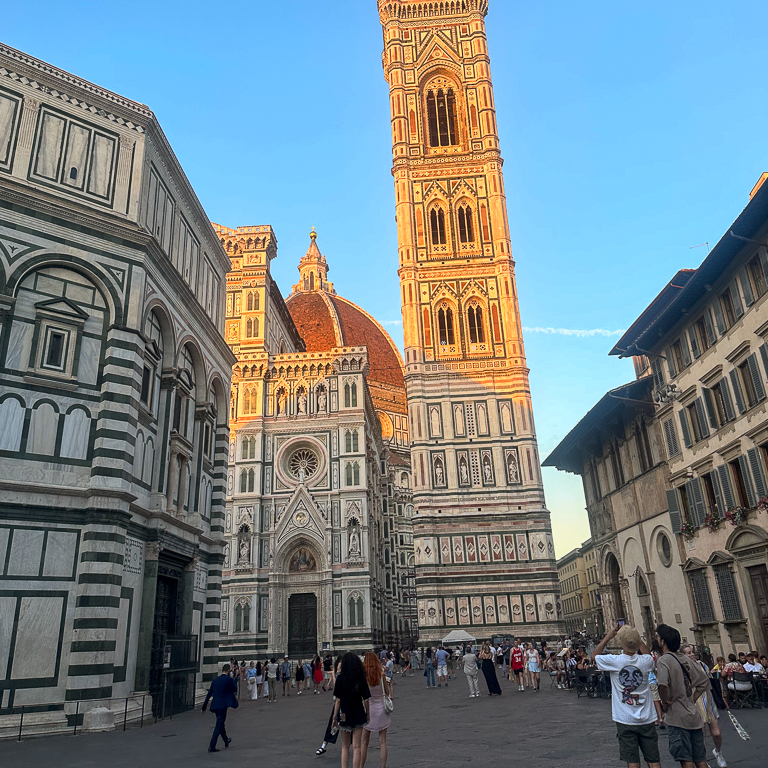
Six Weeks in Florence, Italy
I studied abroad this past summer in Florence and it was an unforgettable experience. I decided fall semester of my junior year at UC Berkeley that I wanted to go abroad, and I thought it was too late to make that decision. But it wasn’t! When I got to Florence, I met a lot of students who were graduated seniors and who’d stayed one last summer semester at their respective UCs to go abroad. Whether you’re a newly admitted student, a transfer, or a senior, it’s never too early or too late to decide to go abroad.
If you’re in the early stages of thinking about studying abroad, I highly recommend reading the Considering Study Abroad? blog as well as the Intern Abroad! blog before this one, so you’re more familiar with the process and the different types of programs available to you.
Finding & Applying to a Program
A lot goes into deciding what program you want to apply for. Here are some of the things I considered, and why the program I ended up choosing was perfect for me.
Costs – Financial Aid paid for most of my trip, and what I paid out of pocket was something I had budgeted and planned for. I was able to plan for this because of the UCEAP Financial Aid Estimator Tool—it accurately reflected my real costs and made budgeting for the trip much easier. There are also scholarships you can apply for, all listed on the Berkeley Study Abroad website.
Academics – By junior year I only had a couple of classes left for my major and was on track to finish my minor by graduation, meaning my summer session could be dedicated purely to my personal and post-grad interests. I’d never taken any media communications-based courses, and the program I was looking into was structured around this topic, so I knew it was perfect for me. A lot of people in the program were completing breadth requirements (a civil engineering friend of mine was completing two breadths by being in the program—she took a language and cultures course and a fashion and media course).
Location & Timing – Florence is the birthplace of the Renaissance, which means it’s a city full of gorgeous architecture, museums, and history—all of which I love. Italy in the summer is really hot, yes, but as a native Californian, I was ready for the heat and I planned accordingly (linen is your best friend for Italian summers). I wanted to spend my last couple of semesters in Berkeley, and since I wasn’t looking to get my classes approved for major requirements, going abroad in the summer worked perfectly for where I was in my academic journey.
Applying – Some UC Education Abroad Program (UCEAP) programs are capped, meaning that they have a limited number of spots—the program I applied to was like this. If you apply as soon as the application opens, it’s a safe bet you’ll get in. I recommend checking in with an advisor if you’re unsure about logistics for programs you’re interested in. The application is very straightforward and nothing to worry about too much. For certain programs, you do not need a passport to apply (for mine you did not need to have one at the time of applying but of course needed one a couple of months before it started).
Local University vs Center – The UCEAP Made In Italy, Florence program was not attached to a local Florentine university. Instead, classes were held in the Accent Center—professors and staff were all Italians, a lot of them born and raised in Florence, and many of them having studied abroad in the US when they were completing their studies. The center had everything we needed, from printing resources to computer stations to study spaces. Someone was always at the front desk to answer any questions, and they also regularly put on programming for us, including opportunities to connect with local Italian students attending university in the city.

Left: my first time seeing my room in Florence. Right: the view from my residence hall window.
Adapting to Italian Living
It was fun to learn about different Italian customs (eating dinner later in the evening, not drinking cappuccinos after noon, and different cultures across the country being a few). The transition and adapting were made easier because of the Accent Center and UCEAP resources that were made available to us.
Arriving – My first couple of days in Florence were dedicated to orientation and introductions at the Accent Center. We had a welcome dinner with everyone in the program, tours of the city pointing out important things to know about like where the English-speaking pharmacists were and local history, and we had time to explore before classes formally started.
Academics – I took two classes in total and was in class Monday through Thursday from 8:30 – 11 a.m. I was taking Made in Italy: Marketing the Italian Lifestyle and Fashion and Media in Italy. Even though I wasn’t in the language class offered in the program, I still picked up essential Italian phrases and even got to use my Spanish often, because a lot of Italians spoke Spanish.
Exploring Italy – I went on two field trips while in the program. One was through the program itself, a field trip to San Gimignano and Siena, by chartered bus. The other was a field trip in my Marketing the Italian Lifestyle class—my professor wanted us to see a Dolce and Gabbana exhibit in Milan and was able to get everything approved so it was covered in our program fees. I also did a lot of exploring on my own, which I’ll talk more about in the next section.

Pictures from my two field trips in the program: Siena’s Duomo and fashion exhibits from the Dolce & Gabbana Museum in Milan.
Yes, There’s Time for Weekend Trips!
I was lucky enough to visit every city I wanted to while I was abroad. Here are some tips for scheduling your trips so you can do the same!
Wait For Your Syllabi – I didn’t know the program schedule or my class schedules until I got to Florence, something I was well aware of when I was accepted into the program. They urged us to not book any trips until we knew our schedules because we might have class field trips on Fridays (like my Milan field trip). As soon as you get your schedule I recommend finalizing any out-of-country trips or ones that are considerably farther than your home city so you can save money on booking.
Ask Around – See if anyone else in the program is going on trips you want to go on too and join a group to help lower costs. You can also ask the staff for your program for any recommendations or best practices for booking trips. Tip: use discounted platforms like Trainline and Ryanair to book your travel. I recommend booking train tickets for farther out regions at least two weeks in advance so rates are cheaper.
Book Ahead – I focused on traveling around Italy during my six weeks because I had already planned to stay an extra week in Europe after the program was over. I traveled around by train, and once I knew specific dates it was easier to plan weekend trips with friends. I was also able to do day trips after classes because my schedule allowed for it.

The Sanctuary of Apollo in Pompeii.
Don’t Be Afraid To Do Things Alone
Flying to Italy was my first time solo traveling and my first time going to Europe. I also didn’t know anyone going into the program—needless to say, I was nervous! But I made friends once I got to Florence and did more solo trips. I went to Verona and Venice on my own, and went on countless walks around Florence by myself, all of which were really fun experiences and made me want to solo travel again in the future.
You learn a lot about yourself in those six weeks. I also started to view my home state in a new way—my professors both loved California, and I knew when I got back I would learn to fall in love with it all over again.

Florence’s Duomo, one of my favorite views on the many walks I took around the city.
Go For It!
If you’re thinking about going abroad for a summer or a semester, I can’t recommend it enough. If you’re feeling anxious about any part of the process, from applying to accessing financial aid to living in a new country, there are resources to help you every step of the way. Reach out to an advisor, get your questions answered, and start planning your trip! You won’t regret it.
Melissa Mora-Gonzalez, Class of 2025, is majoring in English and minoring in conservation and resource studies.
Want More?
- Everything you need to know about financially preparing for your study abroad program
- Read about Kelsey’s summer abroad travels with the Berkeley Symphony Orchestra and her time studying abroad in South America.
- Learn about Vanessa’s summer abroad program in London.